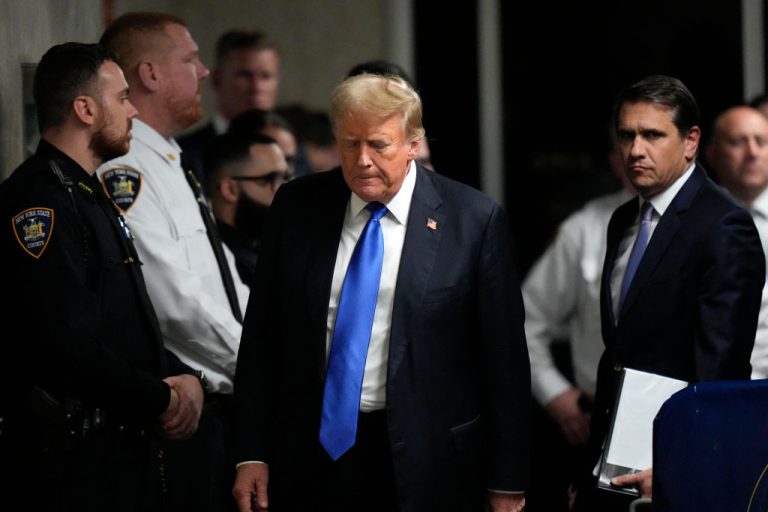In a historic first, Donald Trump, former president and presumptive Republican nominee for the 2024 U.S. presidential election, has become the first president to be convicted on criminal charges.
A jury, consisting of 12 Manhattanites, found Trump guilty 34 times for illegally trying to cover up a $130,000 payment to adult film star Stormy Daniels ahead of his 2016 presidential campaign.
The unprecedented verdict came after a dramatic, and at times salacious, seven-week trial in the Manhattan Supreme Court.
The jury found that Trump, 77, falsified business records in 2017 by saying that he was paying his then-lawyer, Michael Cohen, for “legal services” when he was in fact reimbursing him for a payment he had made to Daniels to keep her from speaking out about a sexual encounter she had with him in 2006.
Cohen, a convicted perjurer, who lied under oath in the past to “protect” Trump, was Manhattan District Attorney Alvin Bragg’s star witness.
Success
You are now signed up for our newsletter
Success
Check your email to complete sign up
It was revealed over the course of the trial that Cohen had stolen $60,000 from one of Trump’s businesses. Trump’s defense did their best to paint him as a serial liar whose only motivation was to see Trump behind bars.
The jury heard how Trump directed Cohen to pay Daniels to secure her silence.
Some of the bombshell evidence included audio recordings of Cohen discussing Trump’s knowledge of the payment and in another recording, Trump appeared to be aware of a plan to pay $150,000 to work with the National Enquirer to bury a story about another alleged mistress, Playboy model Karen McDougal.
“What do we got to pay for this? One-fifty?” Trump is heard asking Cohen on the recording.
READ MORE:
- US Judge Temporarily Prevents Florida Law From Banning Transport of Migrants
- Passport to Taiwan, New York’s Largest Asian American Festival, Celebrates Two Decades of Festivities
- High Inflation, Living Costs Continue to Impact Americans Despite Better Economic Figures
Jail time not expected
Each count Trump was convicted on has a possible jail term of four years, meaning Trump could potentially be imprisoned for upwards of 136 years. However, experts believe this is highly unlikely.
The most likely outcome will be probation.
According to comments made by Manhattan Supreme Court Justice Juan Merchan after the verdict, Trump’s sentencing hearing is scheduled for July 11.
Michael Bachner, a former prosecutor and longtime defense attorney, told the New York Post that Trump will not have to face any travel restrictions until his sentencing and that in his opinion, prosecutors won’t seek jail time ahead of his sentence, something a judge likely would not have granted.
“He will not be remanded,” Bachner said. “There is no requirement that the judge remand him and I would be shocked if the judge were to remand him even if [prosecutors] asked for it.”
“There’s a very decent chance he’s looking at a probationary sentence. It would be unnecessary punishment to incarcerate somebody who very likely isn’t getting a jail sentence,” Bachner added.
Jeffery Lichtman, a defense attorney who represented drug kingpin “El Chapo” Guzman, agrees with Bachner, telling the Post, “I do not expect he’d receive jail time.”
“He’s neither dangerous nor a flight risk. He’s one of the most well known faces in the United States. Where is he going to run?” Litchman said.
READ MORE:
- Biden Approves Hefty Tariff Hike on Chinese Imports, Sparking Economic Debate
- EU Launches Probes Into Chinese Subsidies and Imports
- ‘No Concessions on Democracy and Freedom’: Taiwan’s New President Tells Beijing
Trump to appeal
Trump and his legal team will most likely appeal the convictions.
It’s expected that their first move will be to seek to have Judge Juan Merchan set aside the verdict and if that is denied it will set off at least a year long appeals process by Trump’s side, experts say.
It is not expected that a decision on an appeal will be reached prior to November’s election.
Should Trump lose his initial appeal in the mid-level appeals court, he will have to seek to have the state’s highest court hear the case, something that could take an additional year.
Lichtman said, “An appeal could easily take a year or longer after the sentencing.”
Bachner said that even if Trump is sentenced to jail time, he would most likely remain free until the appeals process was over.
“To the extent there is a reversal on the appeal by the time Trump’s appeal is decided he would have already done his jail time so it would just be unfair to incarcerate him,” Bachner explained.







